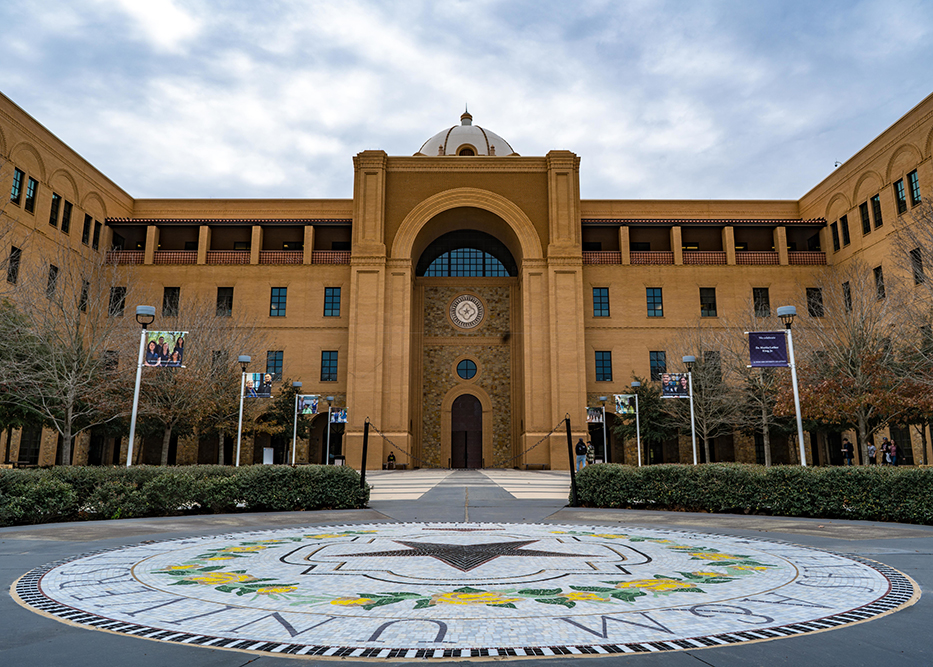Sociology Program
"The sociological imagination enables us to grasp history and biography and the relations between the two within society. This is its task and its promise." C. Wright Mills
The sociology program at A&M-San Antonio offers majors/minors an opportunity to develop team building, critical thinking skills, community engagement, and creative research. The program has a core commitment to sociological theory, research methods, and statistical analysis along with course offerings in gender, sexuality, family, environment, technology, race and ethnic relations, social movements, and death and dying. A jewel in the program is the minor in Mexican American, Latinx, and Borderland Studies, which offers majors the ability to expand their knowledge base to include themes and questions that impact the U.S.-Mexico border region such as immigration, identity, and law. Undergraduate sociology alumni embark on to graduate school studies, or strive on in fields such as business, marketing, criminal justice, law, social work, human relations, non-governmental organizations (NGOs), the medical field, and so much more. Sociology faculty at A&M-San Antonio have research and teaching interests in a wide array of fields of inquiry–women, gender, and sexuality studies, aging, environmental sociology, science and technology, race and ethnic relations, urban sociology, security studies, human rights, and Latinx studies. Despite our faculty diversity of knowledge, one major thread that weaves through the program is our concern with social justice. The 21st century presents renewed challenges of social oppression, economic exploitation, and environmental crises and as sociologists we are steadfastly committed to knowledge production that ushers not only social awareness, but the potential for policy changes that create a more just and egalitarian society.
This is American Sociological Association’s (ASA) definition of Sociology
SOCIOLOGY is:
- The study of society
- A social science involving the study of the social lives of people, groups, and societies
- The study of our behavior as social beings, covering everything from the analysis of short contacts between anonymous individuals on the street to the study of global social processes
- The scientific study of social aggregations, the entities through which humans move throughout their lives'
- An overarching unification of all studies of humankind, including history, psychology, and economics
What Can I Do with a Degree in Sociology?
Getting a college degree is a great accomplishment with real rewards. In 2014, people with college degrees earned more than $17,000 more than people without a college degree, had only about a third the risk of unemployment and only about a quarter the chance of living in poverty (Pew Research 2014).
But only a quarter to a third of college graduates get a job in their degree field (Washington Post 2013). Instead, most college graduates find a career that matches the skills they mastered while in college. So what skills will you master as a sociology student and how can they help you find a good job?
As a sociology student, you will learn about the social structures and forces affecting all our daily lives, changes in those structures, and how social trends and behaviors can be measured – all of which are skills that today’s employers are looking for. Sociology will give you the ability to identify the effects of globalization, interpersonal communication, status, and other phenomena and to apply your knowledge in ways that create real-world opportunities, solutions, and success. We’ll show you how to use technology, research methods, and communication skills to become a valuate team member in today’s diverse marketplace.
And employers are taking note of the importance of skills gained through sociological study. For example, in a study commissioned by the Association of American Colleges and Universities (2006), employers were asked to identify skills they were looking for. Look at these results:
| Science and technology | 82% |
| Global issues | 72% |
| The role of the United States in the world | 60% |
| Cultural values and traditions (U.S. / global) | 53% |
| Teamwork skills in diverse groups | 76% |
| Critical thinking and analytic reasoning | 73% |
| Written and oral communication | 73% |
| Information literacy | 70% |
| Creativity and innovation | 70% |
| Complex problem solving | 64% |
| Quantitative reasoning | 60% |
| Intercultural competence | 76% |
| Intercultural knowledge (global issues) | 72% |
| Ethics and values | 56% |
| Cultural values / traditions – U.S. / global | 53% |
| Applied knowledge in real-world settings | 73% |
Sociology majors frequently find employment ins social services, administrative support, management, marketing, services, research, or as teachers and librarians. Graduates report that their skills in working with people from other groups and cultures, working in a team setting, using the computer to find information, leadership skills, and report writing are used “all the time.”
But most people choose a degree in sociology for another reason: they love the science. The most frequently reported reasons for choosing sociology are because of interesting concepts, enjoying their first sociology course, wanting to understand social forces and individual relationships, wanting to change society and wanting to understand their own life. And enjoying your major is important. People with college degrees live longer, healthier lives. They are happier. They have fewer divorces and stronger ties to their community. (Check out this report).
So with a degree in sociology you get it all: Employment skills that are in demand, a more secure future, and the chance to enjoy your world and to improve the world for others. What will you do with your degree in sociology?
Alpha Kappa Delta

Alpha Kappa Delta (AKD) is the international honors society in sociology. Students are eligible for membership if they meet the following criteria:
- Be a sociology major or minor or be working toward a BAAS with a Sociology or Social Sciences emphasis
- Be a junior
- Have a GPA of 3.3 or higher
- Have a GPA of 3.0 or higher in sociology courses taken at A&M-SA
For more information about AKD, “Click here to go to the AKD website.” or contact Dr. Joseph Simpson jsimpson@tamusa.edu
Century of Sociology
Sociology Faculty
|
Faculty |
|
| Dr. Jennifer G. Correa Associate Professor CAB 350-D Phone: (210)784-2249 Email: jennifer.correa@tamusa.edu |
Dr. Shannon Shen Assistant Professor CAB 351-F Phone: (210)784-2803 Email: sshen@tamusa.edu |
| Dr. Daniel J. Delgado Associate Professor CAB 350-A Phone: (210)784-2204 Email: daniel.delgado@tamusa.edu |
Dr. Joseph M. Simpson Associate Professor CAB 350-C Phone: (210)784-2228 Email: joseph.simpson@tamusa.edu |
| Dr. Vicky Elias Associate Professor CAB 350-B Phone: (210)784-2209 Email: vicky.elias@tamusa.edu |
Dr. Sarah Pollock Lecturer CAB 338 Phone: (210)784-2251 Email: spollock@tamusa.edu |
| Dr. Jacob HardyLecturer in Sociology CAB 338 Phone: (210)784-2251 Email: spollock@tamusa.edu |
|
|
Adjunct Faculty |
|
| Timothy Schmidt Adjunct Professor of Sociology CAB 212 Phone: (210)784-1174 Email: timothy.schmidt@tamusa.edu |
Tracy Schluter Adjunct Professor Phone: (210) 784-2244 Email: tschluter@tamusa.edu |
| Sean Elias Adjunct Professor Email: Sean.Elias@tamusa.edu |
|
Famous People Who Studied Sociology
| Saul Alinsky, father of community organizing |
| Rev. Ralph Abernathy |
| Dan Aykroyd, actor |
| Emily Balch, 1946 Nobel Peace Prize winner |
| Richard Barajas, Texas Supreme Court Chief Justice |
| Saul Bellow, novelist |
| Corey Booker, U.S. Senator from New Jersey |
| Shirley Chisholm, former congresswoman from NY |
| Arne Duncan, Secretary of Education |
| Alexis Herman, form U.S. Secretary of Labor |
| Tim Holden, Congressman from Pennsylvania |
| Rev. Jesse Jackson |
| Brian Jordan, Atlanta Braves |
| Robert Matschullat, private equity investor, former CFO and Vice-Chairman of Seagrams |
|
Cardinal Theodore McCarrick, Archbishop of Washington, D.C. |
| Barbara Mikulski, U.S. Senator from Maryland |
| Kalpen Suresh Modi, White House Liaison for Arts and Humanities |
| Alonzo Mourning, Miami Heat |
| Francis Perkins, former Secretary of Labor |
| Regis Philbin, TV host |
| Ahmad Rashad, sportscaster |
| Ronald Reagan, former U.S. president |
| Michael Savage, author and commentator |
| Dinah Shore, singer |
| Annette Strauss, former mayor of Dallas |
| Bryant Stith, Boston Celtics |
| Joe Theisman, NFL quarterback |
| Gabrielle Union, actress |
| Joan H. Walker, Sr. Vice President Allstate Insurance |
| Maxine Waters, Congresswoman from LA |
| Ruth Westheimer, sexologist |
| Roy Wilkins, former head of NAACP |
| Robin Williams, actor and comedian |
Designed for New or Nontraditional Students
Work, family, school – you have a lot of demands. But you also have big goals. How can you get the quality education that will help you get ahead and at the same time meet all your other responsibilities? To help, we offer a course designed for new and nontraditional students, Developing a Sociological Skill Set. This innovative course is designed for students who need to minimize study time and maximize study results. In this class you will learn how upper division classes are different from classes you’ve had up to now. We will introduce you to methods that will help you meet these new demands and to the people who can help. Topics include:
- Attacking a semester strategically / developing a workload prospectus
- Goal setting
- Technology Skills Assessment
- Communicating with Professors
- Dealing with Stress
- Identifying Your Personality Type and How It Affects Your Academic Experience
- Taking Notes
- Finding Information
- Selecting a Research Topic
- Writing a Research Paper
- Bibliographies and the ASA Style Guide
- Oral Presentations
What is Sociology?

